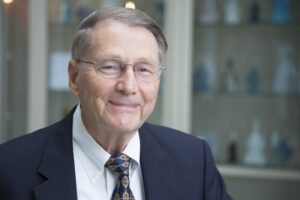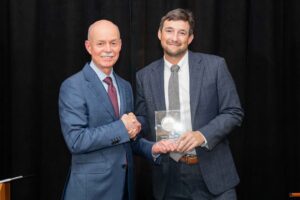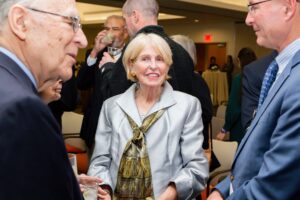Johns Hopkins UniversityEst. 1876
America’s First Research University
A special event at Sibley Memorial Hospital honored and connected two medical pioneers: the late Moody Wharam, MD, for his enduring legacy in the modern management of childhood cancers, and Matthew Ladra, MD, MPH, a forerunner in pediatric proton therapy and the clinician-scientist who will carry on Wharam’s legacy through a professorship in his name.

Endowed by a gift from an anonymous donor family, the Moody D. Wharam, Jr., M.D., Professorship in Pediatric Radiation Oncology is the first for the Sibley Memorial Hospital Foundation. The foundation raises funds for Sibley, a Johns Hopkins hospital located in Washington, D.C.
Johns Hopkins University School of Medicine Dean Theodore DeWeese, MD, presented the professorship at a dedication ceremony held on Nov. 15, 2024. DeWeese, whose medical expertise also includes radiation oncology, recalled Wharam’s influence on him as he recognized Ladra as the professorship’s inaugural recipient.
“Moody was the consummate mentor and colleague, and when he recruited me to Hopkins, he changed my life,” said DeWeese, CEO of Johns Hopkins Medicine. “I am enormously grateful to the donors of this professorship for allowing us to honor the incredible life of Dr. Wharam through this professorship, and to deliver resources that provide stability and fuel creativity for Dr. Ladra’s work — two critical ingredients for growth and discovery.”

Wharam, who died in 2018, specialized in the treatment of children with cancer and played a major role in both developing and delivering better therapies for this patient population. He was a professor of radiation oncology, pediatrics, neurosurgery, and radiologic science at Johns Hopkins, as well as director of the Department of Radiation Oncology and Molecular Radiation Sciences. He helped develop precise implementation of clinical trials to inform the present and future standard of care for pediatric malignancies.
“To succeed in pediatric oncology takes a unique skillset, which Dr. Wharam embodied and which I see echoed in Dr. Ladra — making him a truly befitting recipient to carry this robust legacy forward,” said Akila Viswanathan, MD, MPH, director of Johns Hopkins Radiation Oncology and Molecular Radiation Sciences.
Ladra was the first to complete a fellowship in pediatric proton therapy at Massachusetts General Hospital. He started at the Johns Hopkins Kimmel Cancer Center at Sibley in 2016, when there were no pediatric radiation oncology services. Today Sibley is home to the Johns Hopkins Proton Therapy Center, where Ladra leads a pediatric team and serves as the director of pediatric radiation oncology for the Johns Hopkins Kimmel Cancer Center — as part of a clinical collaboration with Children’s National Hospital, where he carries a dual faculty appointment.

Proton therapy is an advanced and highly precise radiation treatment for tumors. The therapy, which leaves more of the body untouched by radiation, is especially important for treating cancer in children, whose bodies are still growing. Although radiation is an extremely effective tool to kill cancer cells, too much can harm healthy tissue and increase the risk of new cancer.
Ladra is one of only a handful of radiation oncologists whose clinical and research efforts focus exclusively on pediatric patients. The Moody D. Wharam, Jr., M.D., Professorship in Pediatric Radiation Oncology ensures that he and his team can continue to work toward progress in reducing the cognitive impact of radiation in young patients — including expanding research efforts in clinical trials, rehabilitation protocols, and laboratory projects.
Ladra expressed his gratitude to the anonymous donors who endowed the professorship.
“I hope they understand what a profound and positive impact they have already made on our program and that I will do everything I can to continue this progress on their behalf,” he said. “I am equally grateful that this professorship will carry Dr. Wharam’s name so that with each step forward we can honor his legacy.”
Topics: Faculty and Staff, Friends of Johns Hopkins Medicine, Kimmel Cancer Center, Sibley Memorial Hospital, Fuel Discovery